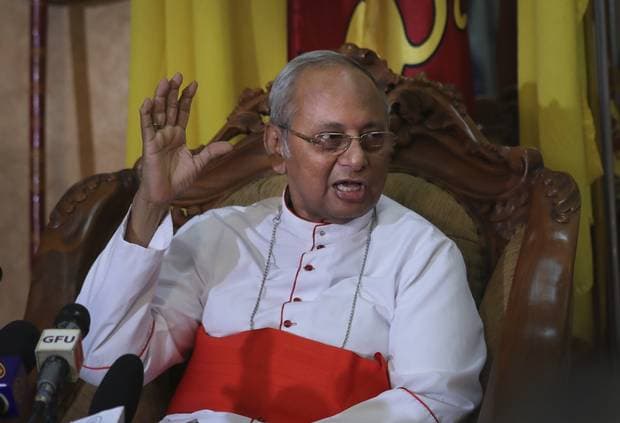This Sunday, Catholics in Sri Lanka will miss Sunday Mass for the second week in a row.
It is a bold and drastic decision made by Cardinal Malcolm Ranjith, the Archbishop of Colombo, and leader of the country’s Catholic Church.
Strange for a former papal diplomat – Ranjith served as the papal nuncio to Indonesia for a short time in the mid-2000s – the Sri Lankan cardinal has been unusually blunt in the aftermath of the Easter bombings which hit two Catholic churches on the South Asian island, as well as an Evangelical church and three hotels.
RELATED: Sri Lanka cardinal warns that if the state doesn’t act, the people will
Ranjith has complained about the government’s response to the attack, and closing the churches to Sunday worship drives the point home that he doesn’t think the security forces are up to the task of protecting the country’s Christian minority.
At the same time, he has supported an emergency law preventing Muslim women from veiling their faces, a move which could cause tension in interfaith relations on the island.
Such outspokenness is not extraordinary for the cardinal: His time as a papal diplomat was bookended by two periods of service in the Roman Curia. Ranjith first served in the Congregation for the Evangelization of Peoples as the adjunct secretary in charge of the Pontifical Mission Societies under St. John Paul II. Later, under Benedict XVI, he served as secretary at the Congregation for Divine Worship.
He was known for giving frank interviews and was probably a bit too forthright for a long career in Rome. Ranjith became Archbishop of Colombo in 2009, but Benedict showed his estimation of the Sri Lankan by naming him a cardinal the next year.
Although a known figure in his homeland, Ranjith has kept a pretty low profile on the international ecclesiastical scene for the past decade (aside from hosting Pope Francis for three days in 2015.)
But now events have put the 71-year-old cardinal on the front pages of the world’s newspapers, and his star is beginning to shine. Whenever that happens, Church watchers always ask, if only in a whisper: Is he papabile?
Ranjith ticks several boxes many cardinals will be looking for in the next conclave: He comes from the global south, speaks several languages, has experience in the Roman Curia, and has served as the head of a diocese – both before and after his time in Rome.
The Sri Lankan cardinal is seen as a conservative, and his support for Benedict’s liberalization of the celebration of the traditional Latin Mass created many enemies in Rome. Last summer, he seemed to support the Sri Lankan government’s plan to restart executions in the country; he later clarified he was against the death penalty but believed that law breakers should be punished for their crimes.
Still, he has mostly avoided being painted as an opponent of the pope’s agenda, such as several Rome-based conservatives, including German Cardinal Gerhard Müller, American Cardinal Raymond Burke, and Guinean Cardinal Robert Sarah. For example, Ranjith didn’t join in on the fight surrounding Amoris Laetitia, the papal document on marriage and the family.
In fact, aside from his conservative theological stance and more traditional liturgical tastes, Ranjith can almost be seen as a “Francis bishop.” He is a promoter of interfaith dialogue, advocates missionary activity, and is not the sort of “airport bishop” that spends most of his time outside of his archdiocese. In the aftermath of the Easter bombings, he has often been seen with people of his archdiocese, gaining “the smell of the sheep.”
However, the differences are apparent, and they might appeal not only to the more conservative cardinals, but to other cardinals from the global south.
His strong remarks on security after the Easter blasts, as well as his support of measures such as banning Islamic face covering, is likely to be seen favorably by many cardinals in the world’s “Middle Belt” – where Islam and Christianity meet in Africa and Asia. Many of them would like to the see the Church be more aggressive in challenging militant Islam, and privately complain that the Islamic leaders meeting Catholic prelates at cocktail parties in Rome are a different stock to the ones with which their people often encounter.
It is not only Islam: In Asia, where the Church is usually a significant minority, Christians have to deal with Buddhist and Hindu nationalists, too. Ranjith knows the problems this causes, but also knows the role the Church can play as peacemaker. In Sri Lanka, Catholics often help bridge the divide between the mostly-Buddhist Sinhalese and predominantly-Hindu Tamil populations on the island. It’s a delicate balancing act, and one the cardinal does well.
Such considerations would probably embarrass Ranjith, who has shown no signs of even contemplating higher office; and by anyone’s finger counting he would probably fall well short on any preliminary ballot. Although Francis has internationalized the College of Cardinals, it is still a predominantly European and American body: Even if the Asian and African cardinals voted as a bloc – which is unlikely – they couldn’t swing a papal election. And the conservatives that would be needed to back such an unlikely candidate are becoming a smaller percentage – both through aging out, and because Francis hasn’t been appointing many new ones.
But still, Ranjith’s name is now out there, and in Vatican politics, that puts him in the starting gate, even if he doesn’t want to run the race.
















